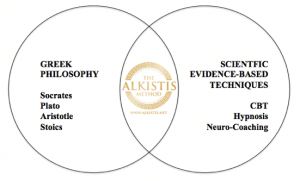Dr. Alkistis Agio is a world-renowned speaker, author and consultant with over twenty years experience in working with professionals to transform fear, frustration, anger and anxiety into confidence and self-leadership, through her proven method, “The ALKISTIS Method”—which integrates the modern scientific, evidence-based techniques of neuro-coaching and CBT, with the ageless wisdom of ancient Greek philosophy. She is the author of The Stoic CEO and is internationally known as an ‘Ambassador’ of Greek philosophyThe daughter of immigrants from Greece, Dr. Agio has been a student of Stoicism for as long as she can remember. Her greatest teacher being her father, who “taught me the four virtues—self-discipline, courage, justice and wisdom—through his own living example; He had been tortured on the island of ‘Macronissos’ by the colonels of the military junta, in Greece in 1967, and survived, reading Greek philosophy including Stoicism in his jail-cell.”
After her recent feature in the article in the Sunday Times of London written by the journalist Gavanndra Hodge, we reached out to Dr. Agio to learn more. In our interview below, Dr. Agio talks about the Modern Stoicism Movement, what some of the recent articles criticizing the resurgence of Stoicism gets wrong, the specific skills and concepts she helps people implement, and much more. Please enjoy our interview with Dr. Alkistis Agio!
Tell us about how you first encountered Stoicism. Why do you think it resonated with you? How have you found Stoicism has most beneficially impacted your life?
When I was a little girl, growing up in Canada, my parents, who were immigrants from Greece, used to read to me, from The Odyssey, the Greek Myths, like Hercules and the Amazons, and Aesop’s Fables. These ancient stories contain Hellenic values, such as Virtue (Aretē), Excellence (Aristeia), Integrity (Ethos) and Flourishing (Eudaimonia).
Later on, when I was about fifteen, my father, Nicholas, often shared Stoic and other philosophy texts and maxims with me, as he recounted war stories of his adolescence fighting Nazis, in WWII, in the high mountains surrounding Sparta, where he was born.
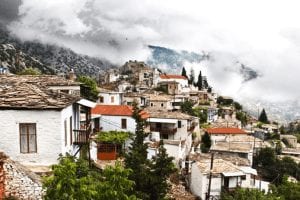
In my father’s mountain village of Kastanitsa, in Arcadia,Greece they still speak ‘Tsakonika’, an ancient Doric dialect, indicating that they are descendants of Spartans. Here, he fought the Nazis at age 14 and was widely known for it, they called him ‘The Captain’. He shared his love of Greek philosophy with me later on, to help me prepare for the ‘battle of life’.
He taught me the four virtues—self-discipline, courage, justice and wisdom—through his own living example; He had been tortured on the island of ‘Macronissos’ by the colonels of the military junta, in Greece in 1967, and survived, reading Greek philosophy including Stoicism in his jail-cell. After that horrendous experience, every apparent obstacle in his life seemed trivial to him.
I found Greek philosophy on my path as a leadership trainer again, where I discovered how Socrates, Aristotle, Plato and the Stoic teachings could be applied for developing Ethos.
In 2019, after I had already written my book, The Stoic CEO, I came across the Modern Stoicism Movement; I was thrilled to see that there was an organized effort to revitalize Stoic practices and that there was even a conference like STOICON, happening all over the world. I felt that I had found my ‘people’. I immediately contacted Donald Robertson, and implored him to organize STOICON in Athens, Greece. He agreed and together with a team of volunteers, we created a historical event; never before, in over two millennia, had the Stoics (worldwide) come together at the Stoa Poikile!
Modern Stoicism has become an integral part of my life and I am deeply grateful to be able to share it with many more people. In my view, I see Modern Stoics as the natural inheritors and torch-bearers of the ‘Light of Greece’.
Do you have a favorite Stoic? Any favorite quotes?
Most of all I love Epictetus, because he is a living example of a person who went through such hardship, and instead of becoming a bitter, vengeful man, he got himself out of slavery, and evolved into a teacher of philosophy.
“It is not events that bother men, so much as their view of them.”
His quote has been so liberating to me in so many challenging situations of my life. It works every time. As Plato taught, “The first and greatest victory is to conquer yourself.”
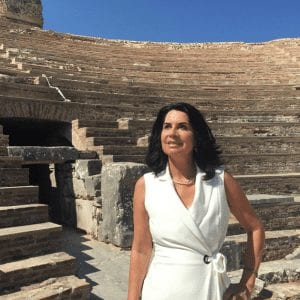
‘In Search of…’ my hero, Epictetus Here at the ancient ‘Odeon’ of Nicoupolis in Greece, where he opened a school after being released from slavery. I try to visit at least once a year.
You founded The Stoic Society of Athens in the 1980-90’s. What is the backstory of it? Why did you start it and how has it evolved to today?
Thank you for asking about that! The Stoic Society of Athens, originally named the ‘Greek Philosophy Dinner Club’ was founded in the 1980-90’s, by me and my sister Matina Agio, The Stylish Stoic. We began hosting informal, non-academic philosophical salons, during our bohemian student years in London and Paris.
These private meetings with a small group of friends, were meant to ‘explore philosophy in its profound, practical application to life’s challenges, referring to works on ancient Greek philosophy – mainly Socrates, Plato, Aristotle and the Stoics, as well as works by other intellectuals like Kazantzakis, Gurdjieff, Frankl, Sartre etc.
Since 2009 the society is established at the 1930’s historic Agiorgiti Residence, that our parents left us when they passed away, where we host private talks, small symposiums, workshops, concerts and events – often accompanied with music, selected wine or gourmet ancient Greek cuisine – courtesy of the home.
Our most recent project is ‘The Philosopher In Residence’. Throughout the year, The Agiorgiti Residence accepts applicants -writers, artists, philosophers, scholars, composers, entrepreneurs, humanists and philhellenes, whose interests concern Greek heritage and culture.
Your now annual event StoiconX is set for October 2020 in Athens. Can you tell the Daily Stoic community about the event and give us a glimpse at what the event is about?
StoiconX in Athens, which we are hoping will be a yearly event is truly unique in the sense that you are actually at the historical location of where Stoicism started. You can walk in the footsteps of Socrates, sit at a cafe next to the excavation site of the Stoa Poikile, Plato’s Garden School and Aristotle’s Lyceum grounds are still there for us to roam around and philosophise and reflect on our life.
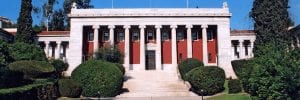
StoiconX Athens is happening again October 17, 2020 on the historic grounds of the American School of Classical Studies in Athens. The amphitheatre is called Costsen Hall. It is by a wonderful coincidence that (ASCSA) is at the heart of the excavation of Stoa Poikile, the ‘Painted Porch’ where Zeno taught his version of Socratic and Cynic teachings, later named ‘Stoicism’.
For me, StoiconX is all about community and friendship, a living ‘Stoa’. I like that you don’t have to explain yourself, there is a sense of familiarity, like brothers and sisters, who share similar values. It’s a given that modern Stoics are people who are ‘working on themselves’, who are trying to live a life of Virtue, with or without religion. We all have a common understanding that life is too short to sweat the small stuff, we are here to be our best self and to serve wherever possible. As Aristotle taught, we are here to ‘flourish’ into our ‘Telos’, our full potential as a human being, to thrive.
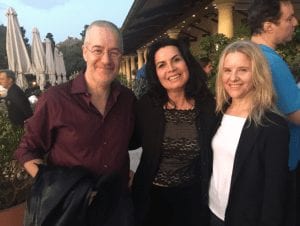
Here is a photo with Massimo Pigliucci and his wife Gillian Dunn, some of the many new friends that I made.
You are also a coach and leadership trainer with over twenty year’s experience in working with professionals to “explore philosophy in its profound, practical application to life’s challenges.” What are the specific skills, ideas and concepts that you help people implement? How does that process look like?
“No man can lead others, who cannot lead himself.” Socrates
How can you lead others, if you can’t lead yourself ?
On the outside, a CEO may appear strong, successful and confident, but on the inside he or she often feels frustrated, angry and anxious. overwhelmed by life’s relentless onslaught of details, problems, alternatives and considerations… They try to manage everything, but they often feel paralyzed by indecision and the feeling of being overwhelmed – a prisoner of their own thoughts.
So where do you begin? I believe it’s self-leadership. Self-Leadership means having, a developed sense of who you are, where you’re going, and what you want, as well as…the ability to formulate a strategy and influence and inspire yourself and others to follow it through. Self-Leadership is probably the most important skill you can ever develop as a person and as a professional. And as you see, it’s quite complicated.
I created The ALKISTIS Method specifically for developing self-leadership.
It is the first-ever method of self-leadership development that effectively integrates the modern scientific, evidence-based techniques of neuro-coaching and CBT, with the ageless wisdom of ancient Greek philosophy. (Especially Socrates, Plato, Aristotle and the Stoic school.)
Applied in practice, The ALKISTIS Method leads to calm, confident, self-leadership, for both personal happiness and professional excellence, something the ancients called “Aristeia”.
We Begin Where Aristotle Left Off…
The first book in history on the art of persuasion, The Rhetoric, was written by the ancient Greek philosopher Aristotle. In his book, he presents the concepts of Ethos (credibility), Pathos (emotion, imagination) and Logos (logic, reason), as the three traits an orator must have in order to influence and persuade his audience.
These three concepts are still the cornerstones of modern leadership today. Let us look at them in more detail:
- Ethos refers to the authority or credibility of the presenter; the moral values he embodies and shares with his audience. For example, being a notable figure in the field in question, or being introduced by one.
- Pathos refers to the audience’s emotions and imagination; their hopes and fears. It can be particularly powerful if it agrees with the underlying values of the audience. Pathos also reflects the emotion or passion expressed by the speaker.
- Logos refers to the facts, data and evidence presented to support the claims, thesis or position of the speaker. The word “logic” is derived from the Greek word, Logos.
This is the basic diagram showing Aristotle’s system “The Rhetorical Triangle”, as it is known:
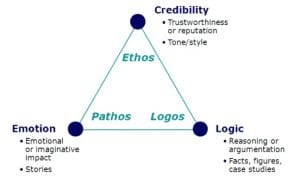
For Aristotle, Ethos, Pathos and Logos, address the qualities that transform an ordinary person into a great influencer, someone who can inspire and lead others.
The unique approach of The ALKISTIS Method is that these same traits are applied to oneself, to lead one’s self, to take charge of your life and guide yourself to flourishing (Eudaimonia).
There are six major exercises (Askesis) which refocuses Aristotle’s insights and broadens their scope. It includes such things as making well thought out, balanced decisions and mastering your thoughts and emotions to command your psycho – physiological ‘state’. Participants are introduced to Stoic practices for integrating into their daily routines and habits.
“Don’t explain your philosophy. Embody it.” – Epictetus
I have taught my method so far mostly in Dubai, AbuDhabi, Greece and Germany, but I welcome an opportunity to travel to anywhere in the world, and I invite people to Greece on short retreats or long stays at the Agiorgiti-Residence, a home for lovers of Greek philosophy.
There’s been several articles recently criticising Silicon Valley’s—and CEOs in general—increasing interest in Stoicism. Having authored The Stoic CEO and being internationally known as an ‘Ambassador’ of Greek philosophy, we’d love your opinion on those pieces and what you make of the modern resurgence of Stoicism?
As you say there have been several articles about Silicon Valley’s obsession with Stoicism, but I think they often have a superficial understanding of what it is, as do many of the followers of Stoicism. For example, in The New York Times, Nellie Bowles, Why Is Silicon Valley So Obsessed With the Virtue of Suffering? in she writes,
“They [Silicon Valley types] sit in painful, silent meditations for weeks on end. They starve for days — on purpose. Cold morning showers are a bragging right. Notoriety is a badge of honor.”
The premise is false. Stoicism does not teach self-imposed suffering, nor ‘showing-off’; Stoics in ancient Greece didn’t sit in painful, silent meditation for weeks on end… That’s more something religious ascetics would do. (I know because I’ve lived in both monasteries and ashrams for months). This is not the way of ancient Greeks, as you can see here from Pericles’ Funeral Oration, which encapsulates not only Stoic values, but the values of all Greek culture:
“We cultivate refinement without extravagance and knowledge without effeminacy; wealth we employ more for use than for show, and place the real disgrace of poverty not in owning to the fact but in declining the struggle against it. Our public men have, besides politics, their private affairs to attend to, and our ordinary citizens, though occupied with the pursuits of industry, are still fair judges of public matters; for, unlike any other nation, regarding him who takes no part in these duties not as unambitious but as useless, we Athenians are able to judge at all events if we cannot originate, and instead of looking on discussion as a stumbling-block in the way of action, we think it an indispensable preliminary to any wise action at all.”
The Stoics don’t follow strict regimes in terms of eating, sleeping, or exercising primarily to improve their physical health any more than anyone else who wants to be healthy and fit. They choose disciplines that are healthy rather than ones that are unhealthy because physical health is a “preferred indifferent” i.e., something that’s preferable to its opposite. Greek philosophers went to the ‘gymnasium’ on a regular basis, even Socrates, who taught,
“No citizen has a right to be an amateur in the matter of physical training…what a disgrace it is for a man to grow old without ever seeing the beauty and strength of which his body is capable.”
In general, I think the popular view of Stoicism as a solemn, serious regiment is misleading. The fact that Stoicism is such a great method for dealing with hardships, has resulted in the view that Stoics are somber, downcast and humorless individuals. The reason they are like that however is not Stoicism—it’s their problems. Stoicism offers a solution, the most effective way of dealing with those problems. Stoicism and Greek philosophy in general, is a way to find Eudaimonia (Flourishing, Thriving) for everyone, even those not handling a tragedy or crisis.
However, I thought the article in the Sunday Times of London recently, that featured a photo of Kathryn Koromilas and myself, was far more objective and excellent. This is probably because the journalist, Gavanndra Hodge, bothered to come to Greece and experience real modern Stoics, and did her research. I had lunch with her, and through our conversation, I saw that she was authentically curious about Stoicism, and had even studied Classics at university. She had a much deeper knowledge than some journalist who tries to write a ‘flashy’ story about Stoicism because it’s trending now.
We welcome publicity (preferred indifferent) but only when the reporter is willing to do investigation with Ethos.
What does your daily Stoic routine look like? Any particular Stoic exercises that you practice regularly, or perhaps other habits and routines the Stoics would have approved of?
Sure, I do a wide variety of Stoic practices…For example, I like to wake up at the crack of dawn each day and do a meditation which combines Marcus Aurelius with something like the Serenity Prayer, that really encapsulates the Stoic approach to life.
“God, grant me the serenity to accept the things I cannot change, Courage to change the things I can, And the wisdom to know the difference.”
Then, I swim to a nearby island (I live on the coast, near Athens) which is exhilarating, but also requires self-discipline.
I have been journaling for as long as I can remember, this practice has helped me to process the events in my life in a way that I can accept what has occured, as an enrichment, in the spirit of “Amor Fati” i.e. loving, accepting what has happened.
Ever since I read about it in my youth, I practice, reflecting on my day in the evening. The Golden Verses of Pythagoras, quoted by Epictetus, famously suggest that we then ask ourselves three questions: What did you do amiss? What did you do? What duty was left undone?
Since I was sixteen, I always had a photo of a skull on my mirror, reminding me of my own mortality, on the brevity of life “Memento Mori”, as the Stoics call it…In fact I would like to say here that one of the reasons that I love living in Athens is because we are constantly reminded of our transience. The ancient monuments are ‘whispering’ to me, saying, “Strive for excellence, Ever to Excel, (AIEN ARISTEUEIN), but also know that you are just passing through here, as we have before you, kings, queens soldiers, craftsmen, philosophers, someday, you will be dust…” So, whenever I am faced with an obstacle or an upsetting event, I practice Epictetus: “It’s not the things that upset me, but my opinions about them.” In my mind, I aim to have a narrative that describes upsetting events without any dramatic language or value judgments, instead, I try to stick to the objective facts. To manage my anger or fear, I picture the longer-term consequences of allowing fear or anger to rule over me, instead I practice responding rationally, with greater self-discipline and certainty. I often ask myself what someone wise, just, self-disciplined and courageous would do when faced with the problem that I am facing. I imagine a situation that’s troubling me from high above, as though looking down on it from a hill or mountaintop, exercising Plato’s view from above. Recently I have been repeating the titles of Ryan Holiday’s trilogy: “The Obstacle Is the Way, Stillness Is The Key, and Ego Is The Enemy”.
There are a few more that I can’t recall right now, but also nurturing true friendships is a central aspect to Greek philosophy, “Philadelphia” (Brotherly/Sisterly Love) is a central component for Eudaimonia.
You also have a great YouTube channel dedicated to philosophy. What are some of your favorite videos you’ve created? What are the videos that you’d recommend the Daily Stoic readers to begin with?
Yes, ‘alkistisTV’ has been going since 2007.
I have different types of videos
- Short Speech “How To Overcome Your Fear & Any Other Obstacle” (Aristotle, Socrates, Stoicism) Link: https://youtu.be/xLnDGl59-uo
- Interview of Donald Robertson (next to Stoa Poikile in Athens) Link: https://youtu.be/YPLCw-5CZOY
- Deeply Relaxing Guided Meditations (based on Stoic philosophy) Link: https://youtu.be/9UMML8t9c0Q
For over thirteen years now I have been filming and editing the videos myself, I am self-taught and unfortunately, I am not gifted in technical things. So, now I am seeking patrons and sponsors to improve the quality, and offer my viewers the best experience possible; To film at breathtaking locations here in Greece, inspire Stoics to visit Greece for the annual StoiconX or to stay for a year at the Agiorgiti-Residence.
In terms of recommending videos to “neophytes”, I would go with the videos of Ryan Holiday (who I would love to interview either here in Greece or via Skype) and also of Massimo Pigliucci.
Aside from the Stoic canon, what books—or even movies and documentaries—would you recommend to our readers who want to live a meaningful life? What would be some good compliments to the typical Stoic reading list?
Well I recommend my book The Stoic CEO, and of course all the top books of the Modern Stoicism Movement.
Movies:
“Forrest Gump” with Tom Hanks
“The Pursuit of Happiness” with Will Smith
“Shawshank Redemption” with Tim Robbins
“Life is Beautiful” with Roberto Benini
“Rocky” with Silvester Stallone
“Slumdog Millionaire” with Dev Patel
“Dead Poet Society” with Robin Williams
“127 Hours” with James Franco
“The Truman Show” with Jim Carey
“Shindler’s List” with Liam Neeson
“Braveheart” with Mel Gibson
“Soul Surfer” with AnnaSophia Robb
THANK YOU once again for allowing me to share my views. Warm Greetings from Greece. See you all at StoiconX October in Athens.
